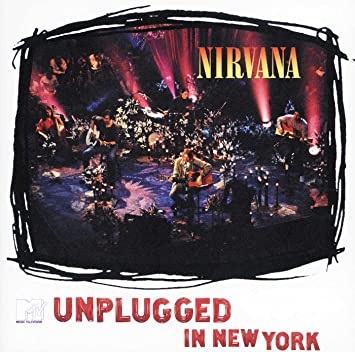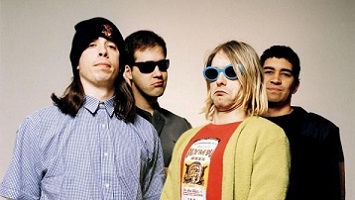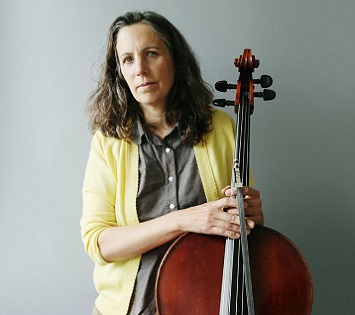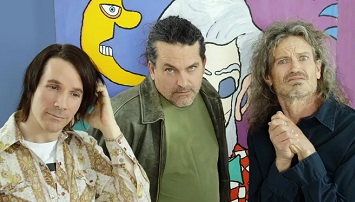It will have been twenty-seven years in November when Nirvana performed with a combination of three other musicians to create the 14-song live album that became MTV Unplugged in New York. The quartet of Kurt Cobain, Krist Novoselic, Dave Grohl and Pat Smear, at points, were augmented with Cris Kirkwood and Curt Kirkwood of Meat Puppets and cellist Lori Goldston through the last, most famous performance of the band in New York City. Each song included below leads to the underlying track from MTV Unplugged in New York.
 (The album cover for Nirvana‘s live album MTV Unplugged in New York. The album, while recorded in 1993, was not released in 1994).
(The album cover for Nirvana‘s live album MTV Unplugged in New York. The album, while recorded in 1993, was not released in 1994).
MTV Unplugged in New York opens with About a Girl from Nirvana‘s debut album, Bleach. The myth underpinning the song is that it was written for a girlfriend of Kurt Cobain‘s, though that girlfriend reportedly learned of it by reading the 1993 Michael Azerrad biography Come as You Are: The Story of Nirvana.
The original version of Come as You Are landed on the Nevermind album. The alternating apparently contradictory seems to be a critique for how the world tells the people of the world, especially those coming of age, to act. The lyric about having no gun, claimed by Cobain to reassure people that his critique was of the larger society rather than individuals in it, took on a meaning not intended in the original song after Cobain had committed suicide with a shotgun.
 (Included in the picture of Nirvana of Seattle, from left are Dave Grohl, Krist Novoselic, Kurt Cobain and Pat Smear).
(Included in the picture of Nirvana of Seattle, from left are Dave Grohl, Krist Novoselic, Kurt Cobain and Pat Smear).
Jesus Doesn’t Want Me for a Sunbeam was written by Eugene Kelly and Frances McKee of the Scottish indie band The Vaselines. Kurt Novoselic plays accordion on what in retrospect is a clear sign of spiritual struggle that Nirvana lead singer Kurt Cobain was experiencing.
Written and originally performed by David Bowie, The Man Who Sold the World gets into the notion of having sold out a sense of responsibility for the moral weight of the world. Whether this stands in for something specific weighing on the band or members of Nirvana isn’t fully clear to me, though the Bowie album from which the song is drawn was one that posterity recognizes resonated with Cobain.
The song Pennyroyal Tea is the first live song on the MTV Unplugged in New York album from the album In Utero. The lyrics referencing Canadian Leonard Cohen can be viewed through the prism of Cobain experiencing a spiritual crisis. My personal take is that it is interesting Cobain seemingly Grohl seemingly disagree on how to play the song before commencing Pennyroyal Tea. Personal pain and loathing come through strongly in this song.
 (Lori Goldston played cello for eight songs that appeared on the album MTV Unplugged in New York, including the four songs beginning with Dumb).
(Lori Goldston played cello for eight songs that appeared on the album MTV Unplugged in New York, including the four songs beginning with Dumb).
Dumb becomes the second song to repeat from an another album, with In Utero getting the second nod. The song, like About a Girl, is described by journalist Gillian G. Gaar as sounding Beatlesque, which is to say inspired by Cobain‘s reported appreciation for The Beatles. Listen for the pop sensibility in About a Girl and Dumb, to see if you catch something different than songs from the album Nevermind.
The song Polly returns Nirvana‘s live session on MTV Unplugged in New York to the album Nevermind. The song is reportedly a song of a man having kidnapped a 14-year-old girl as she was leaving a rock concert. The rather gruesome and graphic torture that follows, and is depicted in the song, is horrific.
On a Plain brings a song thematically of alienation that returns Nirvana‘s live album to the studio album Nevermind. While string together disparate poetry to develop the theme, the clear drug reference Cobain as narrator makes to being so high that he’s on a plain begins the song, and frames the ride clearly with the close of the song in concert.
Something in the Way returns yet again to the studio album Nevermind while changing the emotional level of the show. The song previews the final song thematically where the concert ends, though at this point in the show the sequencing signals a continued numbness that started, at least artificially with the use of drugs with On a Plain, in this song.
 (From left to right are Shandon Sahm, Curt Kirkwood, and Cris Kirkwood of Meat Puppets. Curt Kirkwood and Cris Kirkwood performed with Nirvana for three songs that appeared on the album MTV Unplugged in New York prior to Sahm joining Meat Puppets).
(From left to right are Shandon Sahm, Curt Kirkwood, and Cris Kirkwood of Meat Puppets. Curt Kirkwood and Cris Kirkwood performed with Nirvana for three songs that appeared on the album MTV Unplugged in New York prior to Sahm joining Meat Puppets).
Three songs performed with members of Meat Puppets begins with the song Plateau. Curt Kirkwood of Meat Puppets wrote this and each of the three songs starting here. The song feels like a clear emotional critique of messages offered by spiritual and secular authorities claiming to offer support yet who peddle in cliché that isn’t substantial or legitimately helpful.
Oh, Me starts from an emotional place where Plateau ends, which is to say seeking spiritual and secular substance in the song being sung. The result feels like the singer question motivations for the song. In not seeing the motivation, there is what I call a temporary feeling of being well with where the singer lands.
Lake of Fire, the final Meat Puppets song of the album, seems to offer a repudiation of the notion of being well. Lake of Fire is a clear spiritual repudiation of the behavior of bad folks. The spiritual competition of angels and demons for the souls of these folks is the spectator sport that gives the who notion a lyrical cache.
All Apologies represents the last Nirvana original song on the MTV Unplugged in New York album. All Apologies is the third song drawn from In Utero for Nirvana‘s live album. The notion that the song apologizes for is the spiritual revelation shared that life ends with death, and that all we get to experience is what we take time to understand. In other words, “all in all” reflects the consideration of life and death, with the meaning we take from it being “all we are.”
Huddie Ledbetter, or Lead Belly, arranged the traditional expression of the final song of Nirvana‘s MTV Unplugged in New York album. Where Did You Sleep Last Night emotionally leaves Cobain and the band out in the cold, separated from the lost relationship with one’s beloved after she had been found cheating. Whether drinking had been involved or not is unclear, yet the man is left literally out in the cold after a brutal automobile accident. The feeling, along with the emotion of the ending, is what Nirvana and the band has left us with MTV Unplugged in New York.
This album is one of my favorites, regardless of the genre. My hope is that you found something meaningful in here to appreciate.
Matt – Wednesday, April 29, 2020












 (The album cover for Nirvana‘s live album MTV Unplugged in New York. The album, while recorded in 1993, was not released in 1994).
(The album cover for Nirvana‘s live album MTV Unplugged in New York. The album, while recorded in 1993, was not released in 1994). (Included in the picture of Nirvana of
(Included in the picture of Nirvana of  (Lori Goldston played cello for eight songs that appeared on the album MTV Unplugged in New York, including the four songs beginning with Dumb).
(Lori Goldston played cello for eight songs that appeared on the album MTV Unplugged in New York, including the four songs beginning with Dumb). (From left to right are
(From left to right are